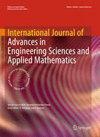单级倒立摆的自适应模糊滑模控制
IF 0.8
Q3 ENGINEERING, MULTIDISCIPLINARY
International Journal of Advances in Engineering Sciences and Applied Mathematics
Pub Date : 2022-12-01
DOI:10.11591/ijaas.v11.i4.pp324-334
引用次数: 1
摘要
滑模控制器(SMC)已成为一种流行的传统控制方法在工业中,由于最有效的控制策略采用非线性控制和抗干扰能力,特别是对于直线轨迹控制。然而,这种控制方法由于高频开关而存在抖振问题。针对这一缺点,传统的SMC采用人工智能方法来消除或减少抖振问题。本文研究了一种结合SMC算法的自适应模糊逻辑系统来解决这一问题。选择模糊逻辑是因为它在使用if-then思维处理非线性特性方面具有优势,而SMC方法则是因为它具有抑制干扰控制的能力。选择倒立摆作为被控对象,利用MATLAB/Simulink对该控制方法进行仿真研究。将模糊逻辑系统与SMC方法相结合,可以自适应地减小线路轨迹跟踪信号的抖振问题。与已有文献中类似对象的自适应模糊SMC算法相比,该算法具有更好的性能和更快的响应速度。本文章由计算机程序翻译,如有差异,请以英文原文为准。
Adaptive fuzzy sliding mode controller for a single-stage inverted pendulum
Sliding mode controller (SMC) has become a popular traditional control method in industries due to the most effective control strategies employing nonlinear control and the ability to reject disturbances, particularly for line trajectory control. However, this control method has chattering problems due to high-frequency switching. To cope with the shortcoming, an artificial intelligence (AI) method is utilized in the traditional SMC to eliminate or reduce this chattering problem. This paper investigates an adaptive fuzzy logic system combined with SMC algorithm to alleviate the problem. Fuzzy logic is chosen due to its advantages in tackling nonlinear properties using if-then thinking, whereas SMC method can be applied due to its ability to reject disturbance control. The inverted pendulum is selected as a controlled object and simulated using MATLAB/Simulink to investigate this control method. By combining the fuzzy logic system and the SMC approach, the chattering problems can be adaptively reduced on the line trajectory tracking signal. The adaptive fuzzy SMC achieved better performance with fast response compared with previous literature algorithms for similar plants.
求助全文
通过发布文献求助,成功后即可免费获取论文全文。
去求助
来源期刊

International Journal of Advances in Engineering Sciences and Applied Mathematics
ENGINEERING, MULTIDISCIPLINARY-
自引率
0.00%
发文量
6
期刊介绍:
International Journal of Advances in Engineering Sciences and Applied Mathematics will be a thematic journal, where each issue will be dedicated to a specific area of engineering and applied mathematics. The journal will accept original articles and will also publish review article that summarize the state of the art and provide a perspective on areas of current research interest.Articles that contain purely theoretical results are discouraged.
 求助内容:
求助内容: 应助结果提醒方式:
应助结果提醒方式:


